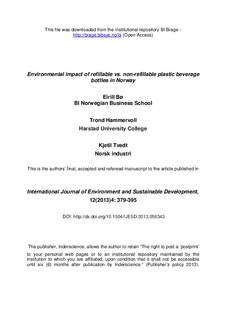Environmental impact of refillable vs. non-refillable plastic beverage bottles in Norway
Journal article, Peer reviewed
Permanent lenke
http://hdl.handle.net/11250/93946Utgivelsesdato
2013Metadata
Vis full innførselSamlinger
- Scientific articles [2173]
Originalversjon
10.1504/IJESD.2013.056343Sammendrag
This research compares the environmental impact, in terms of greenhouse gas emissions, of using refillable polyethylene terephthalate (REF–PET) and non–refillable polyethylene terephthalate (NR–PET) bottles in the Norwegian soft drink and carbonated water market. A Microsoft Excel spread sheet was developed in close cooperation with Coca–Cola, Mack, Telemark Springwater, and three of the main food wholesalers in Norway: NorgesGruppen, Coop, and Rema. While academic writers have criticised such life–cycle analysis as impractical, too time–consuming, expensive, and demanding too much effort, and instead advocated qualitative evaluation methods, this project demonstrates that a data–based approach is fully feasible. The research team identifies the CO2 emissions associated with various activities, and finds that NR–PET bottles generate 18% less CO2 emissions than REF–PET bottles. This research provides practical suggestions for achieving environmentally friendly packaging solutions. As a consequence of the study findings, the grocery industry initiated efforts to change legislation, and major Norwegian actors have changed their policies.
Beskrivelse
This is the authors’ final, accepted and refereed manuscript to the article
